05 Mar Papua New Guinea — In Search of the Elusive Bird-of-Paradise
Among the geographical possibilities that had never occurred to me is the fjord on the east coast of Papua New Guinea.
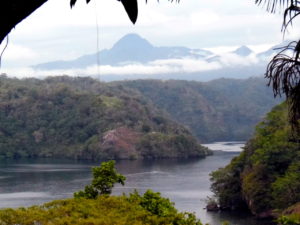
Peg and I arrived at Tufi by way of a small, grassy landing strip decorated with the remains of a previous flight
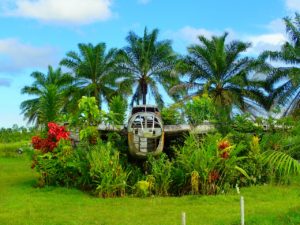
that hadn’t made it back out.
Accompanying us was the only person I ever met who was a genuine Commander of the British Empire. He’d started life as the grandson of a Chinese worker brought to Rabaul by Germans prior to the First World War. During the Second World War while the Japanese ran the place, his father died in an American bombing. As a boy he moved to Port Moresby.
When the time came, he married the improper daughter of a very proper Englishman who, of a morning, would don his bowler, tuck his brolly beneath his arm, step outside to his chauffeured Bentley, if I remember correctly, and off to the City. Banking, you know. For a girl of spirit, there wasn’t a lot of spirit in that kind of life and, as soon as she could, she moved as far away as she could get without circling back from the other side, signed on as a stewardess and began flying around Papua New Guinea. One day the plane broke down in the Highlands, the replacement part wasn’t due for three days, and a Chinese-looking passenger asked if she wanted to spend those three days with him. Either the replacement part never arrived, or they saw something in each other because, some forty years later, they’re still together.
By 1975 when Papua New Guinea achieved independence, her husband had made such a name for himself that the Queen summoned him to Buckingham Palace and promoted him to Commandership in the British Empire. Which was a pretty cool thing to happen and must have brought some satisfaction to the old banker. Or, now that I think about it, maybe not. Maybe discovering his daughter’s Chinese husband held command authority over him in the ranks of chivalric honorifics wasn’t how he’d planned for his life to work out.
All together, there were seven of us in our group. Three women and four men. The plan was for the men to spend the week bobbing around on the ocean trying to catch fish while the ladies SCUBAed beneath the ocean, admiring fish. But yours truly, friend of women’s causes everywhere, dove with the ladies. I got some ribbing about that from the guys until I asked who’d gotten the better end of that deal. The trip was all pretty standard stuff until our hosts organized a sing-sing.
I’d heard about sing-sings, about how tribes from isolated valleys dress up in headdresses resplendent
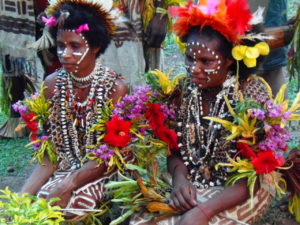
with bird-of-paradise feathers
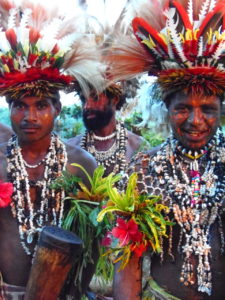
dance and sing,
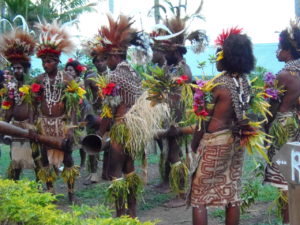
strut their stuff
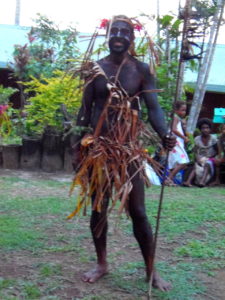
for one another.
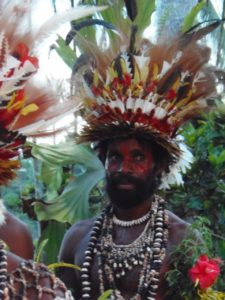
and generally look fine
I don’t think I’d ever even seen a video of one, just pictures in National G when I was a kid. But I gotta tell you, a picture in a magazine, even a beautiful picture in a fine, glossy well-made magazine, doesn’t hold a candle to the real thing.
Seeing those joyous, laughing dancers and all those feathers made Peggy and me want to go find out what New Guinea was like outside the hotel. And it wasn’t just to see the people, there were birds of paradise, too. So we arranged for a boat to deposit us on a isolated stretch of beach a few miles down coast.
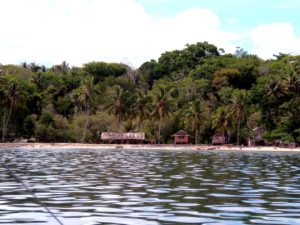
where we were met by a kid.
Then his dad, who ushered us up a very steep, very grassy, path
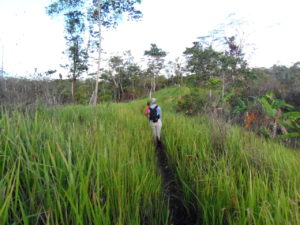
past children playing at the edge of the jungle

and a lady
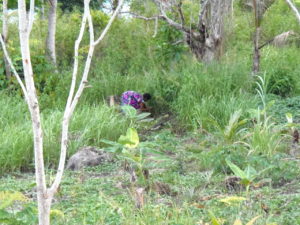
tending her taro.
It was a long climb, and hot. The afternoon was getting on and I was starting to wonder how high the highlands of New Guinea are, when we came to a schoolhouse
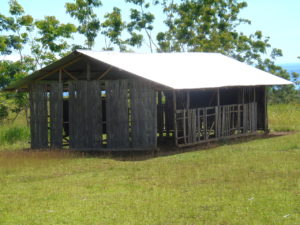
empty, now, where kids sit on grass, doing sums in the shade. Then a dog
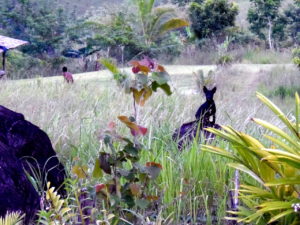
on a rock, guarding his home. Or, maybe, just hoping for something new to come along.
Orotoaba Village is as tidy
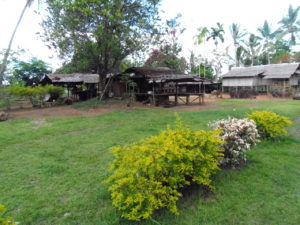
and as pretty as the abandoned plane on the airstrip. That’s the thing about villages in Papua, how well-tended they are, and how manicured the grass, like one of Donald Trump’s golf courses.
A charming lady with a flower in her hair and tribal markings on her face
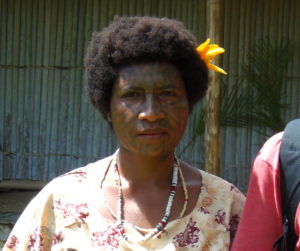
greeted us with coconuts . . . which were just the ticket after a long, hot, thirsty climb. If Americans ever find out about coconuts, futures in Gatorade and Powerade and Xtend are going to fall through the floor.
The lady directed us to a sturdy bamboo hut raised six feet off the ground in picture-book Papuan style, after which the gentleman who’d led us up from the beach arranged to meet us at 3:30 the next morning to go see birds-of-paradise.
Come 3:30 Peg and I were dressed and ready to go, and so was the gentleman, only he seemed a bit cross. Somewhere during the night, getting-up time had backdated itself to 2:00 and we’d arisen an hour-and-a-half late. But, no worries, we’d go looking for birds-of-paradise anyway.
We spent the three hours before sunrise climbing higher into the mountains, while I reminded myself that this was a perfectly nice man, that Orotoaba was a tidy little village, and how very gracious the lady had been with her coconuts. But, still, visions of Michael Rockefeller danced in our heads. At least they danced in mine. I told myself that what happened to Rockefeller wouldn’t happen to us. He’d landed on the south coast of Papua, and the south coast wasn’t anywhere near Orotoaba. And that no place on earth has more different and varied cultures that New Guinea, I’d read that somewhere, so not all the inhabitants ate foreigners. Still, as we climbed deeper into the darkness, and higher onto the mountain, and farther from anybody who knew where we were, an endless loop of “Michael Rowed the boat ashore” played in my head.
At dawn broke, little farms of cassavas and yams and sweet potatoes began to appear in patches in the jungle. Higher still, we came to
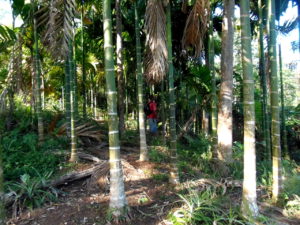
“My grandmother’s coconut farm,” our guide informed us.
“Your grandmother grows coconuts here?”
“All her farms are up here.” Nothing will give you more respect for Papuan grandmothers than the thought of them climbing that mountain to work their farms
Hours later, it seemed like, we came to the top and walked along the ridge and into the ancient tangle of shadowy trees where birds-of-paradise hang out. Or so the guide told us.
He paced back and forth making bird-of-paradise noises, but no answer. “We started too late,” he said, and led us back along the ridge. Then stepped into the trees and began pulling branches away from a dug-out canoe.
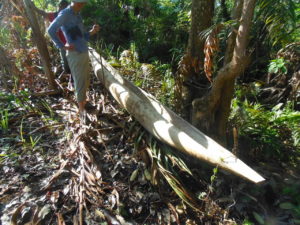
“They keep canoes this far from the ocean?” Papuan grandmothers were starting to seem like people I didn’t want to mess with.
“This is where the right kind of trees grow, so this is where we carve them. We hide them until the wood cures.”
“And you know about this canoe how?”
He shrugged and arranged the branches over the canoe and led us back to the trail.
Stumbling into Orotoaba in early afternoon, we were hot and worn out and footsore but, recharged by the power of coconut, continued downhill.
Back through the tall grass and riots of undergrowth
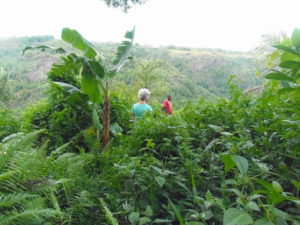
until we were on the beach again.
Where we were met by a gentleman in a dug-out and ferried across the bay to the village of Garoa. Where a third gentleman, and his son,
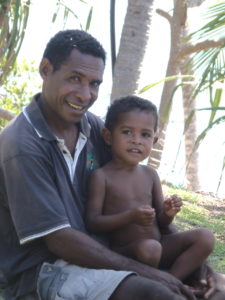
greeted us with coconuts. Then led us to a bamboo hut
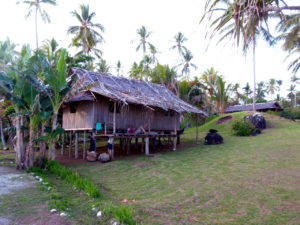
overlooking the beach.
Next morning we awoke to a parade of dug-outs taking people to church or
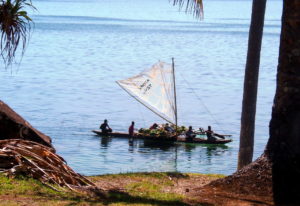
carrying goods to a market that, we were told, was 70 miles further up the coast.
Later that morning, the boat arrived to carry us back to Tufi. Onboard were all five of our travel companions returning from their own expedition to see birds-of-paradise . . . with no better luck than we’d had. “Guide said be ready at four, then claimed we should have set out at 3:00.” It was hard not to suspect a pattern in all this.
Or wonder where those beautiful feathery headdresses the dancers sported at the sing-sing had come from.


No Comments